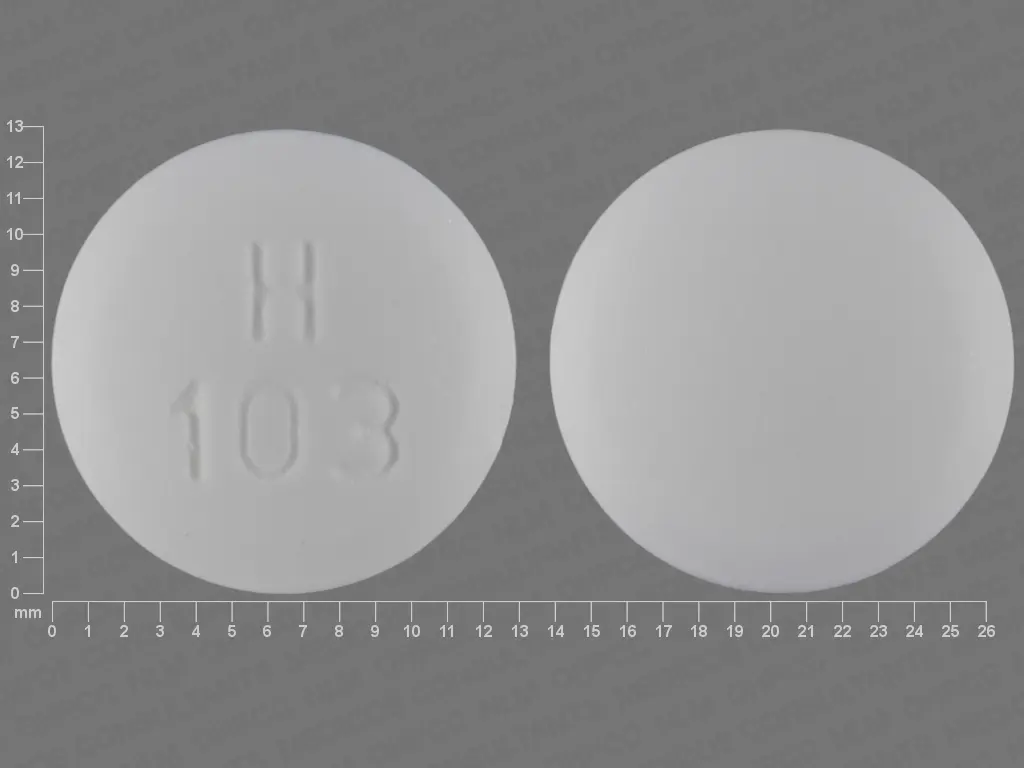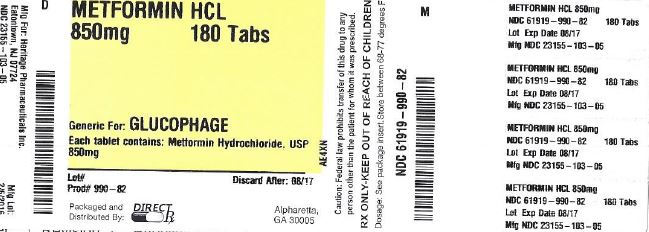METFORMIN HYDROCHLORIDE (metformin hydrochloride 850 mg) Dailymed
Generic: metformin hydrochloride is used for the treatment of Acidosis Diabetes Mellitus, Type 2 Liver Diseases Diabetic Ketoacidosis Renal Insufficiency
IMPRINT: H 103
SHAPE: round
COLOR: white
All Imprints
metformin hydrochloride 850 mg - h 103 round white
metformin hydrochloride 500 mg - h 102 round white
metformin hydrochloride 1000 mg - h 104 oval white
Go PRO for all pill images
Description
Clinical Pharmacology
Clinical Studies
Indications And Usage
Contraindications
Warnings
Lactic acidosis is a rare, but serious, metabolic complication that can occur due to Metformin accumulation during treatment with Metformin Hydrochloride Tablets USP; when it occurs, it is fatal in approximately 50% of cases. Lactic acidosis may also occur in association with a number of pathophysiologic conditions, including diabetes mellitus, and whenever there is significant tissue hypoperfusion and hypoxemia. Lactic acidosis is characterized by elevated blood lactate levels (>5 mmol/L), decreased blood pH, electrolyte disturbances with an increased anion gap, and an increased lactate/pyruvate ratio. When Metformin is implicated as the cause of lactic acidosis, Metformin plasma levels >5 mcg/mL are generally found. The reported incidence of lactic acidosis in patients receiving Metformin hydrochloride is very low (approximately 0.03 cases/1000 patient-years, with approximately 0.015 fatal cases/1000 patient-years). In more than 20,000 patient-years exposure to Metformin in clinical trials, there were no reports of lactic acidosis. Reported cases have occurred primarily in diabetic patients with significant renal insufficiency, including both intrinsic renal disease and renal hypoperfusion, often in the setting of multiple concomitant medical/surgical problems and multiple concomitant medications. Patients with congestive heart failure requiring pharmacologic management, in particular those with unstable or acute congestive heart failure who are at risk of hypoperfusion and hypoxemia, are at increased risk of lactic acidosis. The risk of lactic acidosis increases with the degree of renal dysfunction and the patient’s age. The risk of lactic acidosis may, therefore, be significantly decreased by regular monitoring of renal function in patients taking Metformin Hydrochloride Tablets USP and by use of the minimum effective dose of Metformin Hydrochloride Tablets USP. In particular, treatment of the elderly should be accompanied by careful monitoring of renal function. Metformin Hydrochloride Tablets USP treatment should not be initiated in patients ≥80 years of age unless measurement of creatinine clearance demonstrates that renal function is not reduced, as these patients are more susceptible to developing lactic acidosis. In addition, Metformin Hydrochloride Tablets USP should be promptly withheld in the presence of any condition associated with hypoxemia, dehydration, or sepsis. Because impaired hepatic function may significantly limit the ability to clear lactate, Metformin Hydrochloride Tablets USP should generally be avoided in patients with clinical or laboratory evidence of hepatic disease. Patients should be cautioned against excessive alcohol intake, either acute or chronic, when taking Metformin Hydrochloride Tablets USP, since alcohol potentiates the effects of Metformin hydrochloride on lactate metabolism. In addition, Metformin Hydrochloride Tablets USP should be temporarily discontinued prior to any intravascular radiocontrast study and for any surgical procedure (see also PRECAUTIONS). The onset of lactic acidosis often is subtle, and accompanied only by nonspecific symptoms such as malaise, myalgias, respiratory distress, increasing somnolence, and nonspecific abdominal distress. There may be associated hypothermia, hypotension, and resistant bradyarrhythmias with more marked acidosis. The patient and the patient’s physician must be aware of the possible importance of such symptoms and the patient should be instructed to notify the physician immediately if they occur (see also PRECAUTIONS). Metformin Hydrochloride Tablets USP should be withdrawn until the situation is clarified. Serum electrolytes, ketones, blood glucose, and if indicated, blood pH, lactate levels, and even blood Metformin levels may be useful. Once a patient is stabilized on any dose level of Metformin Hydrochloride Tablets USP, gastrointestinal symptoms, which are common during initiation of therapy, are unlikely to be drug related. Later occurrence of gastrointestinal symptoms could be due to lactic acidosis or other serious disease. Levels of fasting venous plasma lactate above the upper limit of normal but less than 5 mmol/L in patients taking Metformin Hydrochloride Tablets USP do not necessarily indicate impending lactic acidosis and may be explainable by other mechanisms, such as poorly controlled diabetes or obesity, vigorous physical activity, or technical problems in sample handling. (See also PRECAUTIONS.) Lactic acidosis should be suspected in any diabetic patient with metabolic acidosis lacking evidence of ketoacidosis (ketonuria and ketonemia). Lactic acidosis is a medical emergency that must be treated in a hospital setting. In a patient with lactic acidosis who is taking Metformin Hydrochloride Tablets USP, the drug should be discontinued immediately and general supportive measures promptly instituted. Because Metformin hydrochloride is dialyzable (with a clearance of up to 170 mL/min under good hemodynamic conditions), prompt hemodialysis is recommended to correct the acidosis and remove the accumulated Metformin. Such management often results in prompt reversal of symptoms and recovery. (See also CONTRAINDICATIONS and PRECAUTIONS.)
Precautions
Adverse Reactions
Overdosage
Dosage And Administration
Patient Package Insert
Package Label.principal Display Panel
DISCLAIMER:
"This tool does not provide medical advice, and is for informational and educational purposes only, and is not a substitute for professional medical advice, treatment or diagnosis. Call your doctor to receive medical advice. If you think you may have a medical emergency, please dial 911."
"Do not rely on openFDA to make decisions regarding medical care. While we make every effort to ensure that data is accurate, you should assume all results are unvalidated. We may limit or otherwise restrict your access to the API in line with our Terms of Service."
"This product uses publicly available data from the U.S. National Library of Medicine (NLM), National Institutes of Health, Department of Health and Human Services; NLM is not responsible for the product and does not endorse or recommend this or any other product."
PillSync may earn a commission via links on our site



